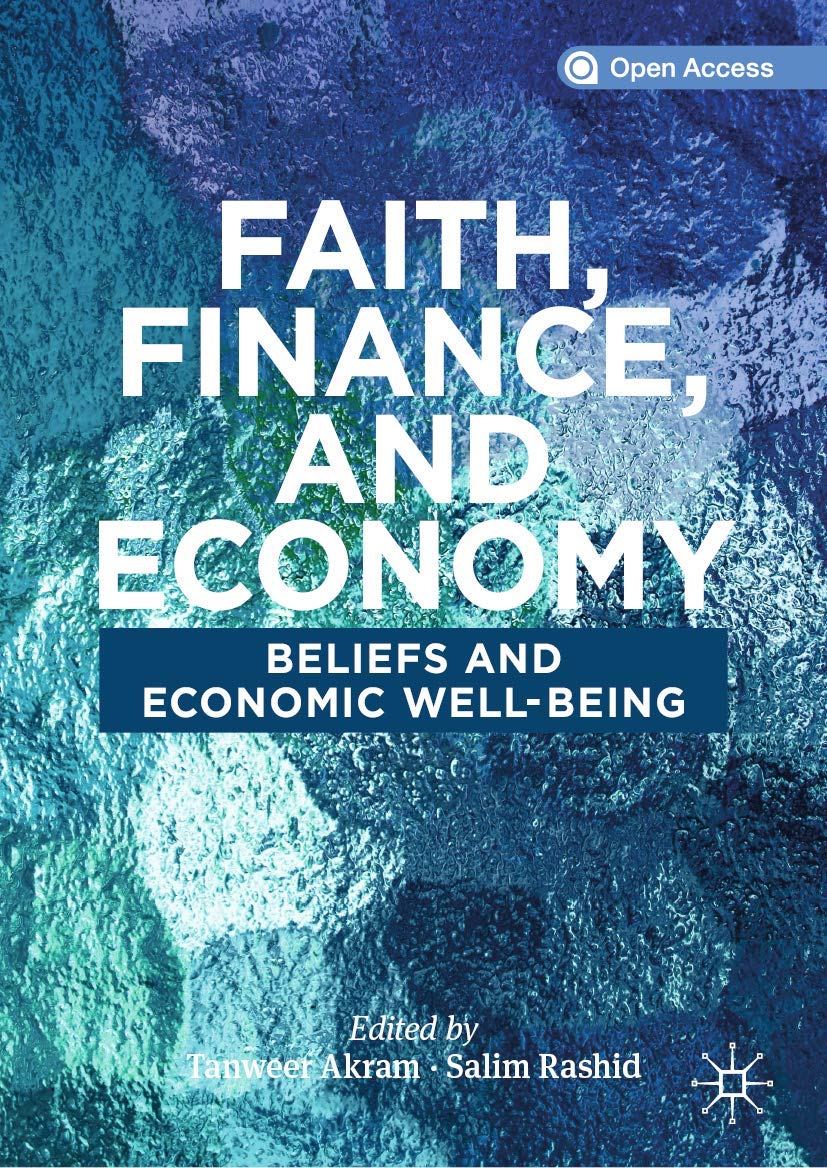Richard Godden: “Faith, Finance, and Economy” by T. Akram and S. Rashid (eds.)

Faith, Finance, and Economy is a collection of essays broadly related to the relationship between faith and financial or economic matters. The editors state that their overall aim “is to convince the reader that faith and finance are not disjoint entities” (page 3). They do this by serving up a collection of essays that provide different examples of the connection between faith and finance rather than by developing a single theme.
The result is a fascinating miscellany containing material that should engage, and probably challenge, most people who are interested in considering the way in which faith does, or may, or should impact financial and economic and, hence, political, matters. Inevitably, however, different readers will be interested in different essays and, although the book includes chapters on some of Gandhi’s philosophical ideas, on attitudes to consumerism in Communist China, on Islamic finance and on the accommodation of faith of all kinds in the workplace, approximately half of it relates to the issue from a specifically Christian perspective, which readers may or may not find helpful.
The essays that focus on Christianity are diverse. The first two (by Ronald Sider and Anne Bradley, respectively) describe how a biblical world view can provide a framework for economic thought. Their views differ materially but both express these views in careful moderate terms and readers who are only familiar with Sider’s famous “Rich Christians in an Age of Hunger” and Bradley’s strong free market views may be surprised by the degree of convergence in what they say. For example Sider concedes basic merits of the free market, commenting that “The market mechanism of supply and demand simply works better” (page 23), adding that “always, government activity must be shaped in a way that nurtures self-sufficiency, not dependency” (page 27). Conversely, Bradley stresses inter-dependency and the dangers of greed, commenting that “The word that best describes God’s creation is inter-dependence” (page 34) and asserting that “We need a society where greed is mitigated (not fuelled by a system of incentives)” (page 44).
The essays thus help to clarify the issues on which bible-believing Christians disagree. Furthermore, all type of Christians would do well to listen to Sider’s warning that the mere fact that they seek to ground their agenda in a normative biblical framework does not guarantee that their concrete proposals will be wise and effective (page 28).
Some of the themes identified by Sider and Bradley are relevant to Heath Carter’s essay entitled “Christianity and Inequality in the Modern United States”, which describes itself as “a concise introduction to the history of social Christianity” (page 175). Unfortunately, however, despite the author’s claim to be writing history, he has produced something akin to a polemical tract, concluding “American Christians played pivotal roles in getting us into this New Gilded Age and we are in urgent need of a renewal of Christian economic thought and practices today if we are to have any hope of finding out way out” (page 192). The essay has heroes and villains, the latter comprising Christians who do not share Carter’s left-wing social gospel views. It is unlikely that it will assist readers understanding the views of those with whom they disagree or perceiving potential weaknesses in their own views.
In contrast, Michael Naughton’s essay, which brings the book to a conclusion, is balanced and carefully argued. It discusses what comprises “good wealth” from within the tradition of Catholic social teaching. Naughton separately analyses the issues of wealth creation, wealth distribution and wealth dispersion (i.e. charity) but recognises that, as he puts it, “The principal challenge is not dividing these three areas…but providing a social vision of how they are related” (page 232). Some readers may legitimately object that his essay does not advance the debate but it is nonetheless a useful reminder of the component parts of the issues involved.
Salim Rashid’s essay is the most specialist of those relating to Christian perspectives. It considers the contribution of Anglican clergy to economic thought in the 18th century. It is probably because this subject might sound dry that Rashid and his co-editor decided not to place it first in the collection but it serves well as an illustration of the book’s primary thesis and, indeed, of Rashid’s contention that “Christianity is the backbone of European economic growth” (page 108).
Rashid particularly focuses on three Anglican clergymen: George Berkeley (whose economic insights included the observation that national debt can stabilise the entire monetary system), Jonathan Swift (who established what may have been the world’s first micro credit facility) and Josiah Tucker (who raged against the economic absurdity of 18th century mercantilism and, consequently, favoured US independence at a time when many feared that it would be economically disastrous).
The essays dealing with issues unconnected with Christianity are even more diverse. Bearing in mind the importance of China and Muslim countries in the world economy today, Karl Gerth’s essay “Consumerism in Contemporary China” and Faisal Kutty’s essay “Islamic Finance, Consumer Protection and Public Policy” are well worth reading. The former comprises an interesting description of the changing policies and attitudes (official and unofficial) to consumer goods over the past 70 years of Communist rule in China; the latter explains the theological issues underlying Islamic finance and discusses some of the issues that such finance faces. Each contains surprises for those unfamiliar with the relevant subject. For example, Gerth suggests that the Mao era promoted rather than quelled consumerism and Kutty gets beyond the common view that Islamic finance is solely about dressing up interest as something else.
Akeel Bilgrami’s essay is the most philosophical of the collection. It considers the relevance of Gandhi’s thinking to the apparent conflict between equality and liberty. Bilgrami suggests that Gandhi’s conception of individual liberty as a form of self-governance and his desire to make overcoming “alienation” the chief goal of politics and social life could provide the key to resolving this conflict. He analyses Locke’s concept of liberty and the “Tragedy of the Commons” and suggests that the pursuit of an un-alienated life undermines the former and renders the latter irrelevant, claiming that even to raise the question “would my efforts and contributions to the collective cultivation (or restraint from over-cultivation) be wasted if others don’t also contribute?” is already to be thoroughly alienated (page 69).
The bringing of an Indian perspective to a debate is interesting but Bilgrami’s style is dense in places and his thesis is ultimately unconvincing. Indeed, it is legitimate, if unpopular, to ask whether Gandhi’s economic thought was ultimately damaging to the alleviation of poverty in India.
The book’s final author, David Miller, addresses a radically different subject. His essay seeks to make the case for employers embracing faith in the workplace: being, as he puts it, “faith-friendly” rather than “faith-avoiding”, “faith-tolerant” or “faith-based”. Although Miller’s contribution is in places shallow and perhaps naïve, it contains a lot of worthwhile analysis and suggestions and deserves to be considered by employers. It may be that the current catchphrase “Bring your whole self to work” may make it easier than has historically been the case for those of strong faith to be open about this (and its consequences) even if their views may not be popular.
Overall, the essays more than adequately demonstrate the relevance of faith, and more broadly, a person’s world view, to finance and economics. Politicians and economists ignore this at their – and our – peril.
“Faith, Finance, and Economy” edited by Tanweer Akram and Salim Rashid was published in 2020 by Palgrave Macmillan (Springer Nature Switzerland) (ISBN-13:9783030387860). 232pp.
 Richard Godden is a Lawyer and has been a Partner with Linklaters for over 30 years during which time he has advised on a wide range of transactions and issues in various parts of the world.
Richard Godden is a Lawyer and has been a Partner with Linklaters for over 30 years during which time he has advised on a wide range of transactions and issues in various parts of the world.
Richard’s experience includes his time as Secretary at the UK Takeover Panel and a secondment to Linklaters’ Hong Kong office. He also served as Global Head of Client Sectors, responsible for Linklaters’ industry sector groups, and was a member of the Global Executive Committee.
